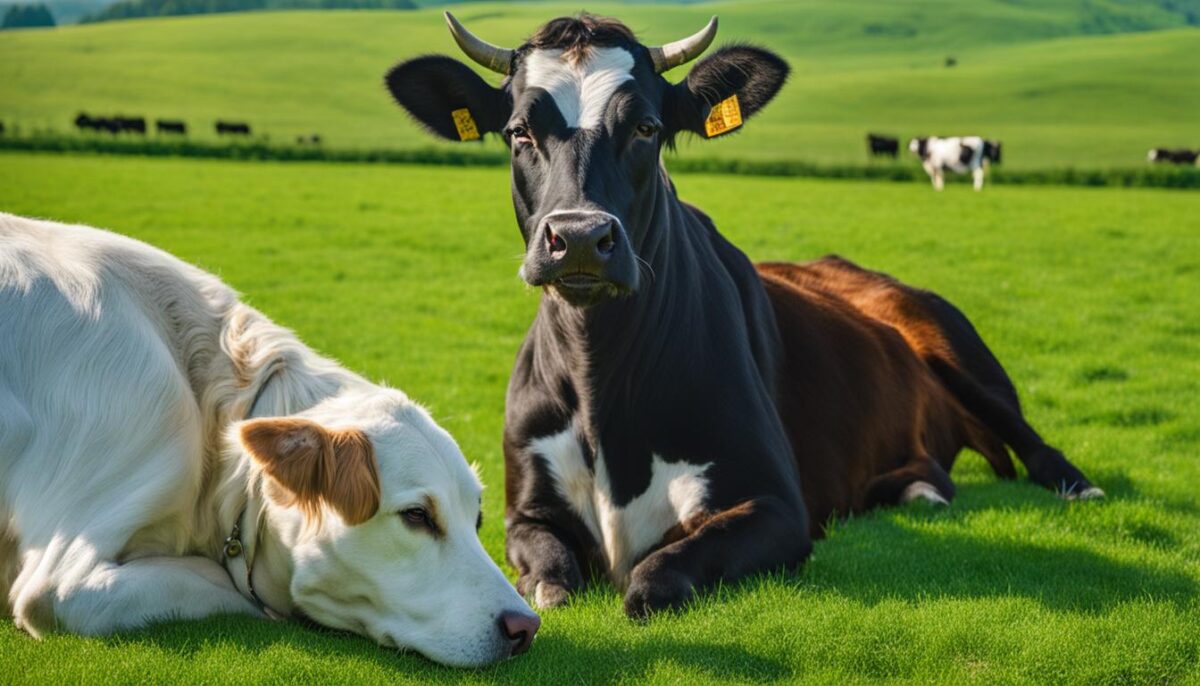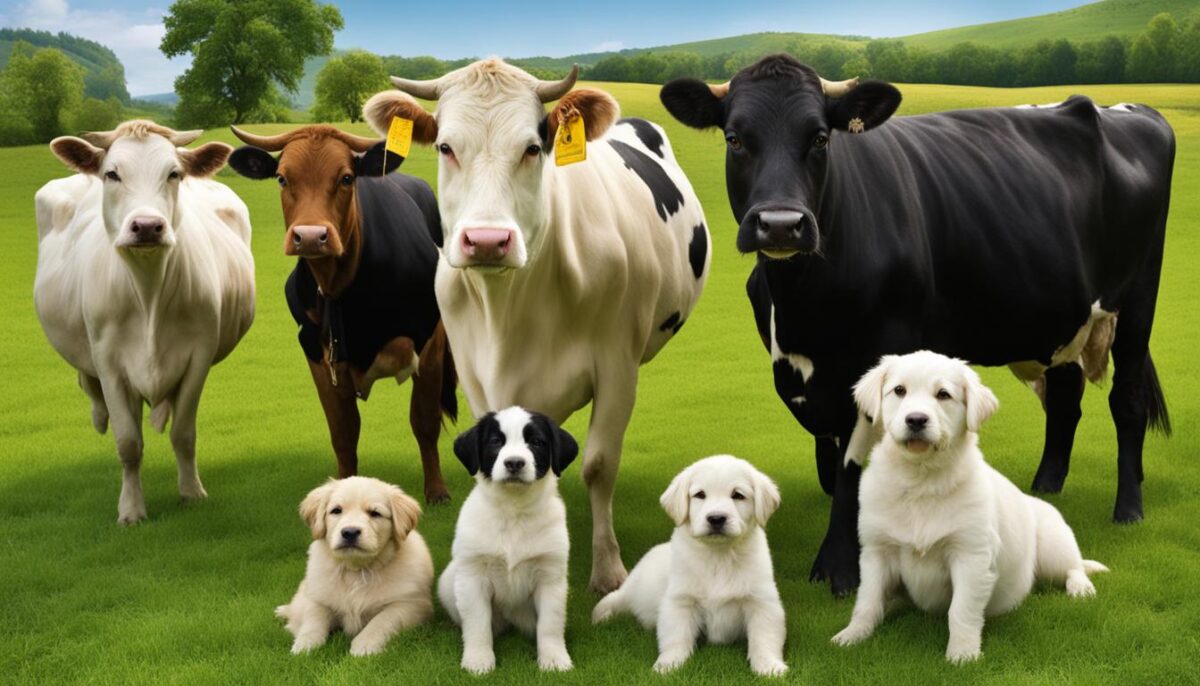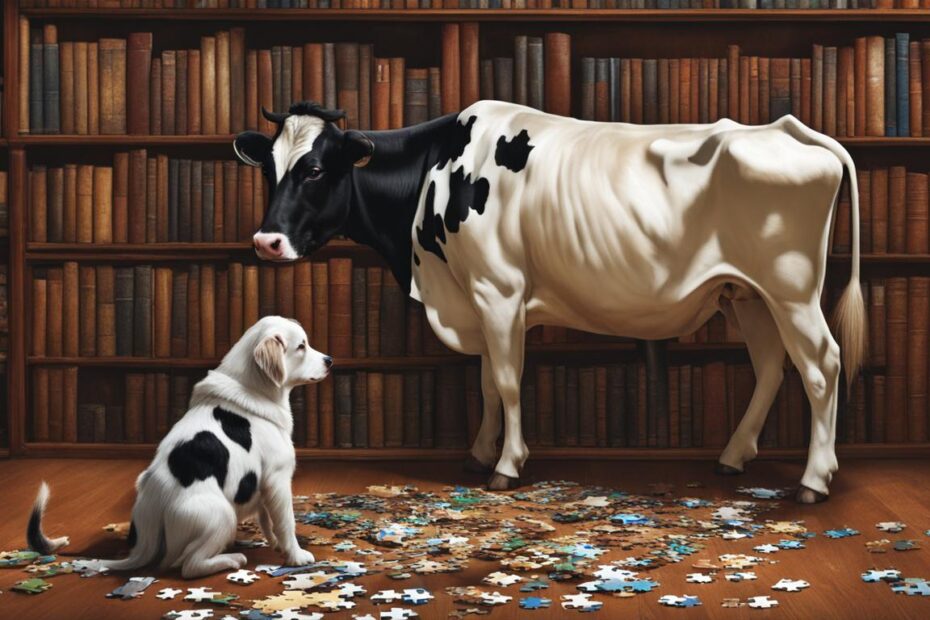When it comes to animal intelligence, the debate between cows and dogs has sparked curiosity. Are cows actually smarter than dogs? Let’s explore the fascinating research and delve into the cognitive abilities of these remarkable creatures.
Key Takeaways:
- Cows are social and intelligent animals, capable of problem-solving and remembering faces.
- Dogs exhibit emotional intelligence, empathy, and have been extensively trained for various tasks.
- Comparing the overall intelligence of cows and dogs can be challenging due to their different strengths and abilities.
- Cows form strong emotional bonds with their calves, while dogs form deep connections with humans.
- Understanding and appreciating animal intelligence can lead to more compassionate choices and a better world for all.
The Intelligence of Cows
Cows possess remarkable cognitive abilities and display a surprising level of intelligence. Contrary to popular belief, these gentle creatures have excellent problem-solving skills and logical reasoning abilities. They have been observed celebrating their successes by leaping and wagging their tails, exhibiting joyful behaviors that showcase their intellectual accomplishments.
Studies have shown that cows have impressive memory and spatial skills. They can remember specific individuals and recognize people who have caused them harm in the past. Just like humans, cows exhibit a range of personalities, with some being more curious or cautious than others. They are capable of forming strong bonds with specific individuals, such as other cows or even humans, which further highlights their emotional intelligence.
“Cows have shown impressive problem-solving and reasoning abilities, despite being less extensively studied than dogs. Their cognitive abilities are often underestimated, but they have proven themselves to be highly intelligent animals.”
Appreciating the intelligence of cows not only challenges misconceptions but also emphasizes the need to treat them with compassion and respect.
The Cognitive Abilities of Cows Compared to Dogs
| Cows | Dogs | |
|---|---|---|
| Problem-Solving Skills | Exhibit excellent problem-solving skills | Known for their problem-solving abilities |
| Memory | Show impressive memory abilities | Demonstrate strong memory capabilities |
| Spatial Skills | Display impressive spatial skills | Have good spatial awareness |
| Personality | Exhibit a range of personalities | Show a variety of personality traits |
| Bonding | Form strong bonds with specific individuals | Have strong bonds with their human companions |
While it may be challenging to directly compare the overall intelligence of cows and dogs due to their different strengths and areas of focus, it is clear that both animals possess unique cognitive abilities that deserve recognition and respect.
The Intelligence of Dogs
Dogs are known for their remarkable cognitive skills and intelligence. They have a unique ability to connect deeply with humans and understand their actions and emotions. Dogs are highly trainable and can learn a wide range of tasks, from fetching objects to performing intricate tricks. Their problem-solving abilities are evident in their ability to find solutions to various challenges.
One remarkable aspect of a dog’s intelligence is their strong sense of loyalty and their ability to form deep bonds with their human companions. They can recognize their human’s facial expressions and interpret their emotions, offering comfort and support when needed. Dogs also possess excellent communication skills and can understand human cues and commands, making them an ideal companion for activities such as search and rescue missions and therapy work.
“Dogs have given us their absolute all. We are the center of their universe. We are the focus of their love and faith and trust. They serve us in return for scraps. It is without a doubt the best deal man has ever made.” – Roger A. Caras
The Canine Cognition Project
The Canine Cognition Project, led by Dr. Alexandra Horowitz at Barnard College, explores the depths of dogs’ cognitive abilities. Through various studies, the project has revealed fascinating insights into their problem-solving skills, memory, and understanding. It also aims to understand how different breeds may possess unique cognitive strengths and weaknesses.
Research conducted by the Canine Cognition Project shows that dogs are capable of sophisticated cognitive tasks, such as object permanence, where they understand that an object continues to exist even when it is out of sight. Studies have also demonstrated a dog’s ability to recognize and remember hundreds of different human words, responding correctly to commands and cues.
| Cows | Dogs | |
|---|---|---|
| Problem-Solving Skills | Excellent | Remarkable |
| Memory | Impressive | Exceptional |
| Communication | Limited | Advanced |
| Understanding of Human Emotions | Less Studied | Well-documented |
Dog Intelligence vs. Cow Intelligence
When comparing the intelligence of dogs and cows, it’s important to note that they excel in different areas. While dogs possess advanced problem-solving skills and communication abilities, cows demonstrate impressive memory and problem-solving skills. Dogs have been extensively trained and domesticated, which enhances their cognitive abilities in various areas.
Although cows have not received as much scientific attention as dogs, recent studies have highlighted their cognitive abilities and emotional intelligence. Cows display problem-solving skills and can remember specific individuals who have treated them poorly. They also show a range of emotions and form strong bonds with their herd members.
In conclusion, both dogs and cows exhibit intelligence in their own unique ways. Understanding and appreciating the cognitive skills of both animals can deepen our empathy and compassion for all creatures, leading to a more harmonious coexistence.

Comparing Cow and Dog Intelligence
When it comes to comparing the intelligence of cows and dogs, it’s important to consider their unique strengths and abilities. While dogs have been extensively studied and trained, cows have often been underestimated in terms of their cognitive skills. Let’s explore the cognitive abilities of both animals and gain a deeper understanding of their intelligence.
The Cognitive Skills of Cows and Dogs
Cows have shown impressive problem-solving skills and logical reasoning abilities. They are capable of celebrating their successes and display joyful behaviors when they solve intellectual challenges. Despite being less extensively studied than dogs, cows have demonstrated impressive memory and spatial skills. They also exhibit a range of personalities, forming strong bonds with specific individuals and even remembering people who have caused them harm in the past.
Dogs, on the other hand, are renowned for their intelligence and sensitivity. They have the ability to connect deeply with humans, understanding and anticipating their actions and emotions. Dogs exhibit problem-solving abilities and can learn a wide range of tasks. Known for their loyalty, dogs form strong bonds with their human companions and excel at communicating and understanding human cues and commands.
A Comparative Look at Intelligence
Comparing the overall intelligence of cows and dogs can be challenging, as they possess different cognitive strengths. While dogs have been specifically bred and trained for tasks that require human interaction, cows have shown remarkable problem-solving and reasoning abilities in their own right. Understanding and appreciating the unique cognitive skills of both animals allows us to recognize and respect their intelligence in different contexts.
| Intelligence Traits | Cows | Dogs |
|---|---|---|
| Problem-Solving | Impressive problem-solving skills | Exhibit problem-solving abilities |
| Memory | Demonstrate impressive memory skills | Show memory capabilities |
| Communication | Communicate with specific individuals | Excel at understanding human cues and commands |
Both cows and dogs exhibit intelligence and cognitive skills that deserve recognition. While dogs may have undergone more extensive training, cows have shown remarkable problem-solving and memory capabilities. Understanding and appreciating the unique cognitive abilities of both animals allows us to gain a deeper appreciation for their intelligence and the different ways they interact with the world around them.
Emotional Intelligence in Cows
Cows possess remarkable emotional intelligence and form strong emotional bonds with other cows and their offspring. They exhibit a range of emotions, including joy, fear, and distress. One significant example of their emotional intelligence is the deep bond between mother cows and their calves. When separated, mother cows experience intense distress and grief, often bellowing and crying continuously in search of their lost calves.
Not only do cows experience emotional pain when separated from their calves, but they also seek comfort and support from other cows in the herd. These compassionate interactions among cows demonstrate their ability to understand and respond to the emotional needs of their fellow herd members. It is clear that cows have a keen sense of empathy and form profound emotional connections.
In the words of Dr. Marc Bekoff, an expert in animal emotions, “Cows are social, sensitive individuals capable of experiencing a range of emotions, including joy, fear, and grief. Their emotional intelligence deserves our recognition and respect.”
The Emotional Toll of Cow and Calf Separation
The separation of cows and calves is a common practice in the dairy industry, causing significant emotional distress to both mother and calf. This practice is rooted in the economic demands of milk production, as dairy cows are impregnated repeatedly to maintain milk production levels. Shortly after birth, their calves are taken away, often within hours or days, causing immense emotional trauma for both cow and calf.
Understanding and acknowledging the emotional intelligence of cows sheds light on the ethical concerns surrounding cow and calf separation. It calls for a reassessment of the practices within the dairy industry and the promotion of alternative options that prioritize the emotional well-being of these intelligent and sentient beings.
Table: Emotional Intelligence Comparison between Cows and Dogs
| Cows | Dogs | |
|---|---|---|
| Ability to form emotional bonds | High | High |
| Recognition of distress in others | Yes | Yes |
| Empathy towards others | Yes | Yes |
| Response to emotional cues | Yes | Yes |
Both cows and dogs exhibit remarkable emotional intelligence, forming strong emotional bonds and demonstrating empathy towards others. While cows are often overlooked in discussions about emotional intelligence, their ability to recognize distress, respond to emotional cues, and form deep emotional connections deserves recognition and respect.
Emotional Intelligence in Dogs
When it comes to emotional intelligence, dogs are truly exceptional. Their innate ability to form deep bonds with humans and understand their emotions sets them apart from other animals. Dogs have a unique capacity for empathy, allowing them to sense when their human companions are feeling down or upset. They instinctively respond with comforting actions, such as snuggling up close or offering gentle nudges of affection. This emotional connection between dogs and humans is often referred to as the “dog-human bond,” and it is a testament to the remarkable empathy that dogs possess.
Dogs also display empathy towards other animals, demonstrating their ability to understand and respond to the emotions of those around them. Studies have shown that dogs can sense when other animals are in distress or pain and will often try to alleviate their suffering. This compassionate behavior is a clear indication of the high emotional intelligence that dogs possess.

“Dogs have given us their absolute all. We are the center of their universe. We are the focus of their love and faith and trust. They serve us in return for scraps. It is without a doubt the best deal man has ever made.” – Roger A. Caras
The dog’s ability to understand and respond to human emotions has made them invaluable companions and service animals. They are often trained to assist individuals with emotional and mental health needs, providing comfort, support, and a sense of security. This unique bond between dogs and humans highlights the emotional intelligence of these remarkable animals and the enormous positive impact they have on our lives.
| Emotional Intelligence in Dogs | Emotional Intelligence in Cows |
|---|---|
| Dogs have a remarkable ability to form deep bonds with humans and understand their emotions. | Cows exhibit emotional intelligence and form strong emotional bonds with other cows as well as their offspring. |
| Dogs display empathy towards humans and other animals, often seeking to provide comfort and support. | Mother cows show distress and grief when their calves are separated from them, often bellowing and crying continuously. |
| Dogs are often trained to assist individuals with emotional and mental health needs, providing comfort, support, and a sense of security. | The separation of cows and calves in the dairy industry causes significant emotional distress to both mother and calf. |
The Emotional Connection
The emotional intelligence of dogs allows them to form deep and meaningful connections with both humans and other animals. Through their empathetic nature, dogs bring joy, comfort, and companionship to our lives, making them incredible companions and true friends.
The Misunderstood World of Animal Intelligence
Research on animal intelligence has revealed fascinating insights into the cognitive abilities and emotions of various species. Animals, once thought to have limited intellectual capacities, are now recognized for their advanced problem-solving skills, emotional intelligence, and social bonds. This growing body of knowledge challenges long-held assumptions and underscores the need to understand and respect the intelligence and emotions of animals.
Animal Intelligence Research
Studies conducted on animal intelligence have demonstrated that numerous species possess cognitive abilities that were once believed to be exclusive to humans. From tool use and complex problem-solving to communication and social learning, animals exhibit a wide range of intellectual capabilities. Research has shown that animals such as dolphins, elephants, and primates can recognize themselves in mirrors, solve puzzles, and even use tools to obtain food. These findings highlight the cognitive complexity and sophistication present within the animal kingdom.
“Animals possess cognitive abilities that were once believed to be exclusive to humans.”
Animal Emotions and Intelligence
Alongside their cognitive abilities, animals also possess a rich emotional world. They experience a range of emotions, including joy, fear, grief, and empathy. Studies have shown that animals form deep social bonds and display compassion towards members of their own species and even other species. For example, elephants mourn their deceased loved ones, dolphins engage in cooperative behaviors, and dogs show empathy towards humans in distress. These emotions and the ability to form complex relationships challenge the notion that animals lack emotional depth.
Animal Cognition
The field of animal cognition examines the mental processes and abilities of animals, shedding light on their capacity for learning, memory, and problem-solving. Animals have been shown to possess excellent memories, with some species demonstrating impressive navigation skills over long distances. Additionally, research has revealed that animals can learn through observation and imitation, proving their ability to acquire knowledge and skills from their environment and social interactions. These findings emphasize the intricate cognitive abilities possessed by animals.
| Animal | Cognitive Abilities | Emotional Intelligence |
|---|---|---|
| Dolphins | Tool use, problem-solving, self-recognition | Strong social bonds, empathy |
| Elephants | Long-term memory, complex communication | Mourning rituals, altruistic behavior |
| Dogs | Learning, human communication, problem-solving | Empathy, loyalty |
The emerging field of animal cognition and the exploration of emotional intelligence in animals have shattered misconceptions about their intellectual capacities. By recognizing and appreciating the intelligence and emotions of animals, we can foster a greater sense of empathy and compassion towards all living beings, promoting their well-being and ensuring a more harmonious coexistence.
The Importance of Treating Animals with Compassion
When it comes to animal welfare, it is crucial to recognize the importance of treating animals with compassion. Farm animals, such as cows and dogs, have rich emotional lives and strong social bonds. They experience pain, suffering, and joy, just like humans. By understanding and acknowledging the intelligence and emotions of these animals, we can make more compassionate choices that align with our values.
One of the most effective ways to reduce animal suffering is by choosing a vegan diet. By eliminating animal products from our plates, we can significantly reduce the demand for factory farming and contribute to a more ethical and sustainable food system. Fortunately, there are numerous delicious and healthy plant-based alternatives available, making it easier than ever to make compassionate choices.
| Benefits of Choosing a Vegan Diet |
|---|
| 1. Eliminates animal suffering and promotes animal welfare |
| 2. Reduces environmental impact, including greenhouse gas emissions and deforestation |
| 3. Improves personal health with a diet rich in fruits, vegetables, and whole grains |
| 4. Supports ethical and sustainable food production |
By adopting a vegan lifestyle, individuals can actively contribute to the well-being of animals and create a kinder world. Not only does this choice benefit animals, but it also brings about positive environmental and health impacts. With an abundance of plant-based alternatives and resources available, anyone can make a difference and help eliminate the suffering of animals in the food industry.

The Power of Plant-Based Alternatives
Embracing a plant-based diet is not only a way to support animal welfare, but it also offers numerous benefits for your health and the environment. A vegan lifestyle is centered around consuming foods that are derived from plants, such as fruits, vegetables, grains, legumes, nuts, and seeds. By choosing cruelty-free choices, you can make a positive impact on the well-being of animals while enjoying delicious and nutritious meals.
“The greatness of a nation and its moral progress can be judged by the way its animals are treated.” – Mahatma Gandhi
Plant-based alternatives provide a wide range of options that can easily replace animal-based products. Whether it’s plant-based milk, cheese, meat substitutes, or even ice cream, there are numerous tasty and cruelty-free alternatives available. These alternatives are not only satisfying and flavorful, but they also offer a sustainable and environmentally friendly choice.
Transitioning to a plant-based lifestyle can be easy and enjoyable. There are plenty of free recipes, beginner-friendly tips, and resources available online to help you embark on this journey. The plant-based community is thriving, and thousands of people have already discovered the satisfaction and fulfillment that comes with making compassionate choices.
| Benefits of a Plant-Based Diet | Benefits of a Vegan Lifestyle |
|---|---|
|
|
By adopting a plant-based diet and lifestyle, you have the power to make a difference. You can contribute to a kinder world by choosing cruelty-free options and advocating for animal welfare. Every meal you enjoy without animal products is a step towards creating a more compassionate and sustainable future for all.
Taking Action for a Kinder World
To create a kinder world for animals, it is important to go beyond personal choices and actively advocate for better treatment and protection of farmed animals. By supporting animal advocacy organizations and initiatives, individuals can play a significant role in ending factory farming and improving animal welfare.
One way to take action is by signing petitions that raise awareness and push for legislative changes to protect farmed animals. These petitions can address issues such as banning cruel farming practices, improving living conditions, and promoting ethical treatment. Additionally, donating to reputable organizations that work tirelessly to protect and care for farmed animals can make a difference in their lives.
Participating in campaigns and volunteering for animal advocacy groups can also help contribute to a kinder world. These activities can involve raising awareness through social media campaigns, organizing protests or events, and educating the public about the realities of factory farming. By actively engaging in these activities, individuals can inspire others to make compassionate choices and support animal welfare.
It is essential for individuals to come together and use their voices to advocate for the well-being of farmed animals. Through collective action, we can bring about meaningful change and create a world where animals are treated with compassion, dignity, and respect.
Table: Ways to Take Action for a Kinder World
| Actions | Description |
|---|---|
| Sign Petitions | Support legislative changes and advocate for better treatment of farmed animals by signing petitions. |
| Donate | Contribute to reputable organizations that work towards ending factory farming and improving animal welfare. |
| Participate in Campaigns | Engage in social media campaigns, protests, and events to raise awareness and educate the public about animal welfare issues. |
| Volunteer | Offer your time and skills to animal advocacy groups to further their mission and support their initiatives. |
By taking action and standing up for the rights of farmed animals, we can contribute to the creation of a kinder world for all living beings. Together, we can work towards ending factory farming, protecting farmed animals, and promoting compassion in our society.

Conclusion
When comparing the intelligence of cows and dogs, it is important to recognize that they possess unique strengths and abilities in different areas. While studies have shown that both cows and dogs exhibit problem-solving skills and the ability to remember information, their cognitive abilities cannot be easily compared. Cows have demonstrated impressive problem-solving and reasoning abilities, despite being less extensively studied than dogs. On the other hand, dogs have been extensively trained and domesticated, which has enhanced their cognitive abilities in certain areas.
Furthermore, both cows and dogs exhibit emotional intelligence and form strong bonds with others. Cows are capable of forming lifelong friendships and have strong bonds between mother cows and their calves. The separation of cows and calves in the dairy industry causes significant emotional distress to both mother and calf. Dogs, on the other hand, are known for their deep connections with humans, their ability to understand and anticipate human actions and emotions, and their loyalty to their human companions.
Understanding and appreciating the intelligence and emotions of animals, such as cows and dogs, is crucial for making compassionate choices and creating a better world for all living beings. By recognizing that both cows and dogs possess cognitive abilities and emotional intelligence, we can advocate for their well-being and make informed choices that align with our values. Further research and ethical considerations are necessary to ensure the fair treatment and protection of animals in our society.
FAQ
Are cows smarter than dogs?
Comparing the intelligence of cows and dogs is challenging as they have different strengths and abilities. Both cows and dogs exhibit problem-solving skills and the ability to remember information, but they excel in different areas.
What cognitive abilities do cows have?
Cows have excellent problem-solving skills and logical reasoning abilities. They also display impressive memory and spatial skills. Despite being less extensively studied than dogs, cows have shown impressive problem-solving and reasoning abilities.
What cognitive abilities do dogs have?
Dogs are known for their intelligence and sensitivity. They exhibit problem-solving abilities, can anticipate and understand human actions and emotions, and have the capacity to learn a wide range of tasks. Dogs have been extensively trained and domesticated, which has enhanced their cognitive abilities in certain areas.
How do cows display emotional intelligence?
Cows form strong emotional bonds with other cows and their offspring. They experience distress and grief when separated from their calves and exhibit a range of emotions. Mother cows show distress and cry continuously when separated from their calves, while other cows in the herd try to comfort and support them.
How do dogs display emotional intelligence?
Dogs are known for their emotional intelligence and ability to form deep bonds with humans. They can sense human emotions and provide comfort and support. Dogs exhibit empathy towards their human companions and can understand and respond to their emotions.
What is the importance of treating animals with compassion?
Recognizing and understanding the intelligence and emotions of farm animals, such as cows, is essential for treating them with compassion and ensuring their well-being. Choosing a vegan diet is an effective way to eliminate the suffering of these animals and make compassionate choices aligned with our values.
What are plant-based alternatives?
Plant-based alternatives provide a healthy, sustainable, and cruelty-free option for those who want to make a positive impact on animal welfare. They are delicious and nutritious alternatives to animal products and can be easily incorporated into a vegan lifestyle.
How can I take action for a kinder world?
By supporting organizations and initiatives working to end factory farming and promote animal welfare, individuals can play a role in protecting and advocating for farmed animals. Petitions, donations, and participation in campaigns are powerful ways to make a difference.
Are cows and dogs equally intelligent?
Comparing the overall intelligence of cows and dogs can be challenging due to their different strengths and areas of focus. Both cows and dogs possess unique cognitive abilities and emotional intelligence that deserve recognition and respect.


